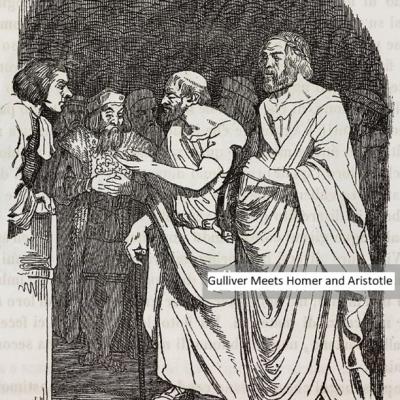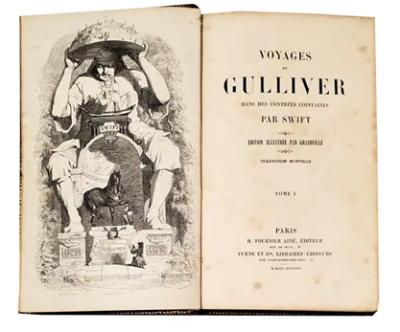The Ghost of Aristotle

Summon up the ghost of Aristotle with Gulliver.
In Part Three of the Anglo-Irish satirist Jonathan Swift’s Travels into Several Remote Nations of the World. In Four Parts. By Lemuel Gulliver (1726), Gulliver meets the shade of Aristotle. He visits the island of Glubbdubdrib, whose governor has necromantic powers.
After talking to Alexander the Great, Hannibal, Caesar, Pompey, and Brutus, in Chapter Eight he sets aside a day to “see those ancients who were most renowned for wit and learning” and proposes “that Homer and Aristotle might appear at the head of all their commentators”. The scene was illustrated in an 1842 edition by “Grandville” (Jean Ignace Isidore Gerard).
Aristotle (middle) is shorter than Homer and unprepossessing, reflecting Swift’s view of the superiority of literature over philosophy: “Aristotle stooped much, and made use of a staff. His visage was meagre, his hair lank and thin, and his voice hollow”.
But sympathy with Aristotle is here too. Part of the joke is that he has no idea about the mighty army of commentators on his works; after becoming “out of all patience” when Gulliver tells him what the Aristotelian commentator Duns Scotus and the anti-Aristotelian Petrus Ramus had done to his legacy, Aristotle asks “whether the rest of the tribe were as great dunces as themselves?”
Gulliver then asks the governor to summon up René Descartes and the Lucretian thinker Pierre Gassendi, “to explain their systems to Aristotle”.
Swift’s hilarious account has Gulliver remember that the “great philosopher freely acknowledged his own mistakes in natural philosophy, because he proceeded in many things upon conjecture, as all men must do”. But he predicts the same fate for the works of his interlocutors: he said that “new systems of nature were but new fashions, which would vary in every age; and even those, who pretend to demonstrate them from mathematical principles, would flourish but a short period of time, and be out of vogue”. Wise words indeed.




